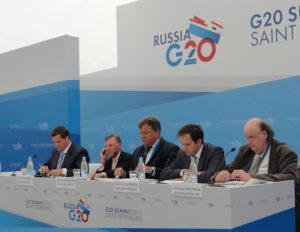ICC responds favourably to G20 final communiqué
The G20 Leaders’ Summit in Saint Petersburg was far from the failure described by many owing to a deadlock over Syria, and maintained a focus on shared economic objectives for re-balancing the world economy through sustainable growth and jobs.

Among the detailed commitments set forth, was the G20 declaration’s call to achieve a trade facilitation agreement at the World Trade Organization (WTO) Ministerial Conference in December. This standalone agreement could increase global GDP by US$960 billion annually, generate US$1 trillion in world export gains, and thereby create 21 million new jobs, according to a recent study commissioned by the International Chamber of Commerce (ICC) and conducted by the Peterson Institute.
The untold story from Saint Petersburg is the steady progress G20 leaders are achieving between Summits on their shared economic agenda to increase sustainable growth and encourage job creation.
“The substantive nature and the deep degree of policy stewardship embodied in the Leaders’ declaration is evidence that the annual Summit is only the most visible part of an ongoing, collaborative and productive process that has evolved since the G20’s inception at head of state level in 2009,” said ICC Secretary General Jean-Guy Carrier.
The work carried out by G20 officials over the last year has produced agreements on trade, trade finance, protectionism, taxation, anti-corruption and other measures central to the global business agenda.
G20 leaders themselves were clearly confident about the value of their deliberations and conveyed highlights of their work programme to business leaders invited to a special session for social partners. Members of the ICC delegation participating in the meeting included: Harold (Terry) McGraw III, ICC Chairman and President, Chairman, President and CEO of McGraw Hill Financial; Marcus Wallenberg, Chairman of the ICC G20 Advisory Group and Chairman of Sweden’s SEB, Alejandro Ramirez, CEO of Mexico’s Cinépolis and Mr Carrier.
During the meeting, French President Francois Hollande told business leaders:
“Agreements reached between G20 governments have the objective of creating economic growth and jobs, particularly for the young. We have also given a strong signal on trade, and there is a convergence of interests to agree.”
German Chancellor Angela Merkel emphasized that the G20 had agreed strong measures to fight protectionism, which she said is the worst enemy of jobs and of growth. President of the European Commission José Manuel Barroso highlighted the importance of the G20’s extension of the stand-still on protectionist measures to 2016 and the G20’s consensus to “get a deal done” at the December WTO Ministerial Conference in Bali.
“ICC has been promoting policy recommendations to the G20 on these issues for several years. It’s both rewarding to see progress and gratifying to receive endorsement from G20 leaders on the crucial role of Business-20 contributions,” said Mr Carrier. “The special session for social partners, held within the framework of the G20 Leaders’ Summit, represented a significant development in the ongoing government-business dialogue in the G20 since Korea sponsored the first Business-20 Summit in 2010.”
Trade
Protectionism undermines the benefits of trade and, therefore, ICC has routinely called on the G20 to eliminate trade protectionism measures and other barriers to open trade. To this end, ICC is pleased that G20 leaders have extended the standstill agreement until 2016. ICC urges all G20 leaders to commit to finalizing a WTO trade facilitation agreement at the 9th Ministerial Conference of the WTO in December 2013 in Bali.
Investment
While ICC is encouraged by the recognition of G20 leaders on “the key role of long-term investment for sustainable growth and job creation, as well as the importance of putting in place conditions that could promote long-term financing for investment, including in infrastructure and small- and medium-sized enterprises (SMEs)”, more needs to be done in order to address the fall in FDI following the global economic recession, improve underlying investment conditions and enable long-term project financing. The establishment of a high-standard multilateral framework for investment, led by G20 countries and based on ICC Guidelines for International Investment could help restore FDI flows by as much as 25% and address impediments to the mobilization of private capital.
Anti-Corruption
ICC appreciates the G20’s acknowledgement of the leadership role it can play in this area and its resolve to enhance transparency and close implementation and enforcement gaps. Moving forward, ICC urges G20 leaders to honour commitments for the complete ratification of the UN Convention against Corruption (UNCAC) which could result in the eradication of US$1 trillion in bribes, and lead to a 1% increase in economic growth in developing countries and a 5% increase in investment.
Taxation
ICC welcomes the G20 endorsement of the action plan from the Organisation for Economic Cooperation and Development (OECD) that identifies a set of domestic and international actions to address the problems of base erosion and profit sharing (BEPS). ICC concurs with findings in the OECD report that unintended double non-taxation should be addressed by governments.
Energy
ICC is pleased that the G20 continues to address critical issues related to cross-border energy and the challenge of climate change. It welcomes the extended mandate for the G20 Energy Sustainability Working Group (ESWG), and encourages the ESWG to continue its cooperation with international organizations regarding sustainable development, clean energy, and energy efficiency.
Business Engagement
ICC attaches great significance to the G20’s continued acknowledgement of the importance of business input to the G20 agenda. This year’s special session for “social partners” and the formal engagement with business leaders highlighted the steady improvement in government-business dialogue in the G20 since Korea sponsored the first Business-20 Summit in Seoul in 2010. But more can be done by the G20 to tap business expertise. ICC encourages the G20 to more systematically invite business into the process, and, as the long-standing interlocutor for international business, ICC stands ready to support and implement.
